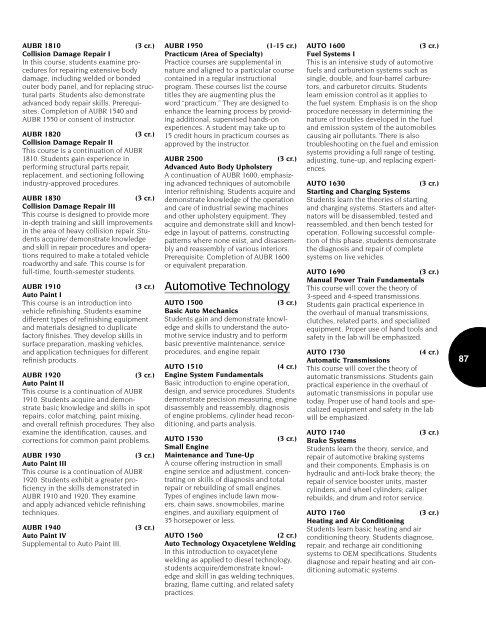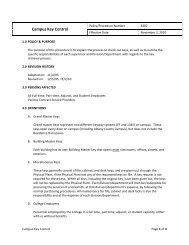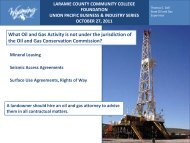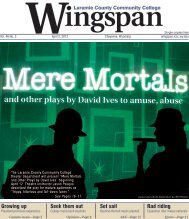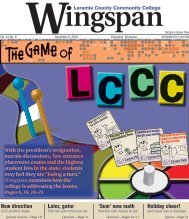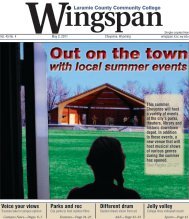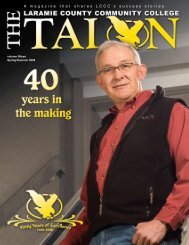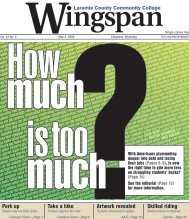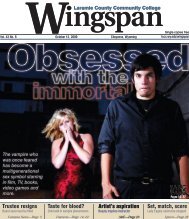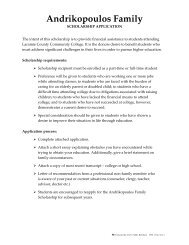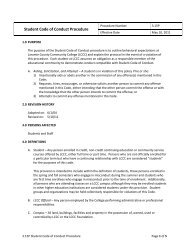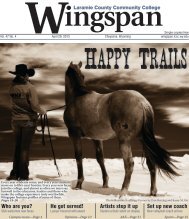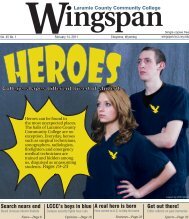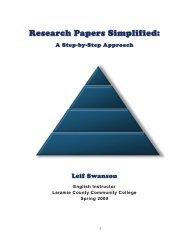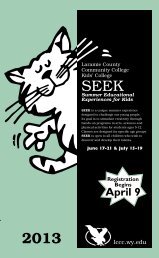LCCC policy - Laramie County Community College
LCCC policy - Laramie County Community College
LCCC policy - Laramie County Community College
Create successful ePaper yourself
Turn your PDF publications into a flip-book with our unique Google optimized e-Paper software.
AUBR 1810<br />
(3 cr.)<br />
Collision Damage Repair I<br />
In this course, students examine procedures<br />
for repairing extensive body<br />
damage, including welded or bonded<br />
outer body panel, and for replacing structural<br />
parts. Students also demonstrate<br />
advanced body repair skills. Prerequisites:<br />
Completion of AUBR 1540 and<br />
AUBR 1550 or consent of instructor.<br />
AUBR 1820<br />
(3 cr.)<br />
Collision Damage Repair II<br />
This course is a continuation of AUBR<br />
1810. Students gain experience in<br />
performing structural parts repair,<br />
replacement, and sectioning following<br />
industry-approved procedures.<br />
AUBR 1830<br />
(3 cr.)<br />
Collision Damage Repair III<br />
This course is designed to provide more<br />
in-depth training and skill improvements<br />
in the area of heavy collision repair. Students<br />
acquire/ demonstrate knowledge<br />
and skill in repair procedures and operations<br />
required to make a totaled vehicle<br />
roadworthy and safe. This course is for<br />
full-time, fourth-semester students.<br />
AUBR 1910<br />
(3 cr.)<br />
Auto Paint I<br />
This course is an introduction into<br />
vehicle refinishing. Students examine<br />
different types of refinishing equipment<br />
and materials designed to duplicate<br />
factory finishes. They develop skills in<br />
surface preparation, masking vehicles,<br />
and application techniques for different<br />
refinish products.<br />
AUBR 1920<br />
(3 cr.)<br />
Auto Paint II<br />
This course is a continuation of AUBR<br />
1910. Students acquire and demonstrate<br />
basic knowledge and skills in spot<br />
repairs, color matching, paint mixing,<br />
and overall refinish procedures. They also<br />
examine the identification, causes, and<br />
corrections for common paint problems.<br />
AUBR 1930<br />
(3 cr.)<br />
Auto Paint III<br />
This course is a continuation of AUBR<br />
1920. Students exhibit a greater proficiency<br />
in the skills demonstrated in<br />
AUBR 1910 and 1920. They examine<br />
and apply advanced vehicle refinishing<br />
techniques.<br />
AUBR 1940<br />
Auto Paint IV<br />
Supplemental to Auto Paint III.<br />
(3 cr.)<br />
AUBR 1950<br />
(1-15 cr.)<br />
Practicum (Area of Specialty)<br />
Practice courses are supplemental in<br />
nature and aligned to a particular course<br />
contained in a regular instructional<br />
program. These courses list the course<br />
titles they are augmenting plus the<br />
word “practicum.” They are designed to<br />
enhance the learning process by providing<br />
additional, supervised hands-on<br />
experiences. A student may take up to<br />
15 credit hours in practicum courses as<br />
approved by the instructor.<br />
AUBR 2500<br />
(3 cr.)<br />
Advanced Auto Body Upholstery<br />
A continuation of AUBR 1600, emphasizing<br />
advanced techniques of automobile<br />
interior refinishing. Students acquire and<br />
demonstrate knowledge of the operation<br />
and care of industrial sewing machines<br />
and other upholstery equipment. They<br />
acquire and demonstrate skill and knowledge<br />
in layout of patterns, constructing<br />
patterns where none exist, and disassembly<br />
and reassembly of various interiors.<br />
Prerequisite: Completion of AUBR 1600<br />
or equivalent preparation.<br />
Automotive Technology<br />
AUTO 1500<br />
(3 cr.)<br />
Basic Auto Mechanics<br />
Students gain and demonstrate knowledge<br />
and skills to understand the automotive<br />
service industry and to perform<br />
basic preventive maintenance, service<br />
procedures, and engine repair.<br />
AUTO 1510<br />
(4 cr.)<br />
Engine System Fundamentals<br />
Basic introduction to engine operation,<br />
design, and service procedures. Students<br />
demonstrate precision measuring, engine<br />
disassembly and reassembly, diagnosis<br />
of engine problems, cylinder head reconditioning,<br />
and parts analysis.<br />
AUTO 1530<br />
(3 cr.)<br />
Small Engine<br />
Maintenance and Tune-Up<br />
A course offering instruction in small<br />
engine service and adjustment, concentrating<br />
on skills of diagnosis and total<br />
repair or rebuilding of small engines.<br />
Types of engines include lawn mowers,<br />
chain saws, snowmobiles, marine<br />
engines, and auxiliary equipment of<br />
35 horsepower or less.<br />
AUTO 1560<br />
(2 cr.)<br />
Auto Technology Oxyacetylene Welding<br />
In this introduction to oxyacetylene<br />
welding as applied to diesel technology,<br />
students acquire/demonstrate knowledge<br />
and skill in gas welding techniques,<br />
brazing, flame cutting, and related safety<br />
practices.<br />
AUTO 1600<br />
(3 cr.)<br />
Fuel Systems I<br />
This is an intensive study of automotive<br />
fuels and carburetion systems such as<br />
single, double, and four-barrel carburetors,<br />
and carburetor circuits. Students<br />
learn emission control as it applies to<br />
the fuel system. Emphasis is on the shop<br />
procedure necessary in determining the<br />
nature of troubles developed in the fuel<br />
and emission system of the automobiles<br />
causing air pollutants. There is also<br />
troubleshooting on the fuel and emission<br />
systems providing a full range of testing,<br />
adjusting, tune-up, and replacing experiences.<br />
AUTO 1630<br />
(3 cr.)<br />
Starting and Charging Systems<br />
Students learn the theories of starting<br />
and charging systems. Starters and alternators<br />
will be disassembled, tested and<br />
reassembled, and then bench tested for<br />
operation. Following successful completion<br />
of this phase, students demonstrate<br />
the diagnosis and repair of complete<br />
systems on live vehicles.<br />
AUTO 1690<br />
(3 cr.)<br />
Manual Power Train Fundamentals<br />
This course will cover the theory of<br />
3-speed and 4-speed transmissions.<br />
Students gain practical experience in<br />
the overhaul of manual transmissions,<br />
clutches, related parts, and specialized<br />
equipment. Proper use of hand tools and<br />
safety in the lab will be emphasized.<br />
AUTO 1730<br />
(4 cr.)<br />
Automatic Transmissions<br />
This course will cover the theory of<br />
automatic transmissions. Students gain<br />
practical experience in the overhaul of<br />
automatic transmissions in popular use<br />
today. Proper use of hand tools and specialized<br />
equipment and safety in the lab<br />
will be emphasized.<br />
AUTO 1740<br />
(3 cr.)<br />
Brake Systems<br />
Students learn the theory, service, and<br />
repair of automotive braking systems<br />
and their components. Emphasis is on<br />
hydraulic and anti-lock brake theory; the<br />
repair of service booster units, master<br />
cylinders, and wheel cylinders; caliper<br />
rebuilds; and drum and rotor service.<br />
AUTO 1760<br />
(3 cr.)<br />
Heating and Air Conditioning<br />
Students learn basic heating and air<br />
conditioning theory. Students diagnose,<br />
repair, and recharge air conditioning<br />
systems to OEM specifications. Students<br />
diagnose and repair heating and air conditioning<br />
automatic systems.<br />
87


